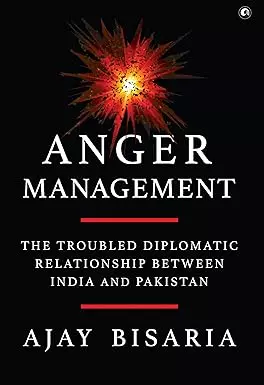Book Review: For good diplomacy don’t just manage anger, channelise it!

In a country like India where official records are not made public even after decades, writings of former officials provide a valuable resource to scholars and anyone else interested in going beyond X, Facebook or WhatsApp to know more about a subject and the imperatives and compulsions that frame India’s approach and policy. In recent years, Indian diplomats have written some very fine books giving insights into the thinking, compulsions and calculations of Indian policy makers. Ambassador Ajay Bisaria’s book on how India-Pakistan relations have panned out over the last seven and a half decades is the latest addition to this growing body of literature. His is a book that cannot be ignored by anyone who is interested in the how, why and what of the troubled relationship between India and Pakistan.
Bisaria’s book is written from the perspective of a practitioner who has used his own experience of dealing with Pakistan as well as the experiences of his predecessors who served in Pakistan to make sense of our neighbour from hell. Far from the boring, anodyne verbiage that bureaucrats are infamous for, Bisaria has a very engaging style of writing — from the title of the book to its content, it is almost like a novel — which makes the book not just a racy read, but also regales the reader with interesting anecdotes and vignettes. But at its heart, it is an academic work which is panoramic in its scale and scope.
Much of the media publicity around the book centred around revelations of what transpired during one of the most tense periods, when the two countries were literally on the brink of a conflict that could easily spiral out of control — the crisis following the Pulwama suicide bombing by Pakistani terrorists and the Indian air strikes in Balakot. Bisaria was then serving as high commissioner in Islamabad and had a ring side view of what happened and what could have happened. But there is a lot more to commend the book, more so because earlier in his career, when Bisaria was serving in the Vajpayee PMO, he witnessed from up close on the inside both the Kargil conflict and the subsequent diplomacy between the two countries.
Going through the book, it is quite apparent that India’s policy towards Pakistan has oscillated between realism and romanticism, with some hoary notion of nostalgia affecting many policy makers of yore. Until at least the first half of the first term of Narendra Modi, every Prime Minister of India seemed to aspire to make a breakthrough in relations with Pakistan, only to realise that pursuing normalisation is a mug’s game. A big problem has been that generally the points of reference of India’s outreach to Pakistan didn’t take into account the objective realities of a country that is unabashed in its enmity towards India which it frames in civilisational terms. With a new generation coming to the fore in both diplomacy and politics, there appears to be a discernible shift in favour of a more cold, calculated, hard-nosed approach and discarding the rose tinted lens of nostalgia and romanticised notions of normal and friendly relations with Pakistan.
The muddled approach towards Pakistan was only partly an affliction of politicians. It was equally if not more a malady of diplomats who after having served in Pakistan suffered from a kind of Stockholm (or should we call it Islamabad/Lahore syndrome). The constant desire to give Pakistan another chance has for long been the bane of India’s policy towards that country. Worse is the Mother India complex of trying to save Pakistan from itself. Bisaria describes how different diplomats have given different prescriptions on fixing ties with Pakistan. What emerges quite clearly is that most of these prescriptions on engaging the Pakistanis have erred on the side of taking a very narrow and limited view of what the craft of diplomacy entails. For some strange reason, Indian diplomats think that remaining engaged is an end in itself when quite clearly, a dialogue is at best a tool of diplomacy, and certainly not the only one.
What most Indian policymakers and diplomats haven’t got about Pakistan is that even the talk of looking for an opportunity to engage or making a breakthrough with Pakistan is seen by the other side as a sign of weakness of “Hindu Baniya” not having the staying power to confront Pakistan. After more than seven decades one would imagine that India would have the clarity that until objective conditions change in Pakistan, efforts to have even a modicum of normalcy is not only pointless but even counterproductive. Of course, this is not to advocate shutting down of communication channels, only to point to the desultoriness of a political dialogue with an unreformed, unreconstructed Pakistan. And yet Indian diplomats persist what what they call out-of-the-box prescriptions — people to people contacts, cultural contacts, opening up trade, etc. — all of which have bombed.
The bottomline of India and Pakistan relationship is that normalcy is not possible until Pakistan reconciles to the reality and existence of India. Bisaria’s tour-de-force which is otherwise a superb book, misses this critical point. At least he doesn’t say it with the starkness and clarity it needs to be said and repeated over and over until it sinks in and is internalised.
The writer is senior fellow, Observer Research Foundation
Anger Management: The Troubled Diplomatic Relationship between India and Pakistan
By Ajay Bisaria
Aleph
pp. 527; Rs 999

